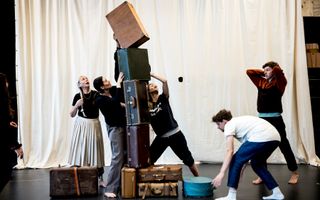 On Stage
On Stage
The following micro scene takes place between Antipholus’ of Ephesus and Dromio of Ephesus. It is a classic Master/Servant scene in which Dromio (Antipholus’ bondman) has just been beaten at the hands of his master. They are very much at odds with each other.
This is an opportunity for students to experiment with Shakespeare’s text in dialogue and to explore conversation between characters as well as their motivations, inner thoughts and outwards expressions.
Actors and director spend a lot of time trying to figure out what ‘motivates’ a scene. Using the small stretch of text below, form pairs, assign roles and begin to read through the text. Once students are comfortable with the flow of the words the task is to ‘play’ with different ideas of what the scene could be and where it could go.
To begin with, play with extreme versions/interpretations of the dialogue.
As a pair, get the scene up onto the floor and play it in the following ways.
- As two best friends
- As two children arguing in the playground
- As two Zen monks on a mountain top
- As two drunks at a bar
- As a pair of soldiers about to battle-it-out on a field
Come back as a group and debrief on the exercise. What version worked the best? Which ones felt the most appropriate?
Back in pairs, try the following, more detailed ideas for the scene. Start to explore power dynamics and see what different levels of status do to the performing of the scene.
Dromio of Syracuse | Antipholus of Syracuse |
A nervous assistant | A tyrannical, bullying boss |
A young, ambitious lawyer | A quiet and calm poet |
An honest motivational speaker | A dodgy politician |
A freedom fighter, standing up to an evil dictatorship | A dictator trying to control all those around him |
A dedicated servant, keen to prove his loyalty, and commitment | A hot-headed young man, venting frustration under frustrating circumstances |
Come back together as a group and debrief on the exercise. Discuss as a class which versions worked and which versions felt less appropriate to the text.
Consider the idea of ‘play’. How does trying multiple possibilities help you as a performer? What does it do for the text? Is it helpful to try different options, or do you find it challenging? If some versions are more suited to the text than others, discuss why.
Micro Scene - ACT II, SCENE II. A public place (edited)
DROMIO OF SYRACUSE
But, I pray, sir why am I beaten?
ANTIPHOLUS OF SYRACUSE
Dost thou not know?
DROMIO OF SYRACUSE
Nothing, sir, but that I am beaten.
ANTIPHOLUS OF SYRACUSE
Shall I tell you why?
DROMIO OF SYRACUSE
Ay, sir, and wherefore; for they say every why hath
a wherefore.
ANTIPHOLUS OF SYRACUSE
Why, first: for flouting me; and then wherefore:
For urging it the second time to me.
DROMIO OF SYRACUSE
Was there ever any man thus beaten out of season,
When in the why and the wherefore is neither rhyme nor
reason?
Well, sir, I thank you.







